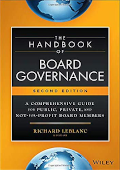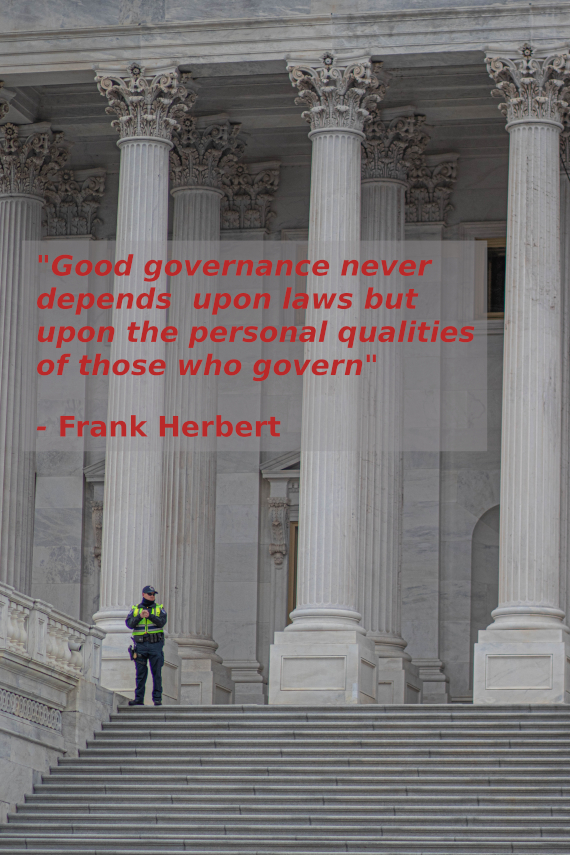|
|
|
|
|
|
|
|
|
Dear reader,
Welcome to the October 2020 edition of The Director's Dilemma. Each month this newsletter looks at a real-life scenario that happened to a board, perhaps to a board like yours, and considers a range of responses. The scenarios are de-identified to protect the individuals concerned.
Our dilemma this month looks at the dilemmas facing a board whose company has outgrown the founder's ability to govern effectively.
I have over twenty-two years' experience consulting to, and serving on, boards. It is a pleasure to share some of it with you in this newsletter and I would be even more delighted to share it with you when your board needs a performance review, strategy workshop, or director education session.
To read this email in a web browser, go to www.mclellan.com.au/newsletter.html and click on 'read the latest issue'. I hope you will enjoy the latest dilemma:

Amelia chairs a not for profit board that has successfully grown the company from less than $2,000,000 turnover to over $20,000,000. The company was founded by an individual with passion and drive who brought several of her own family members into the company to support her in delivering the mission. The founder was CEO for the first few years and is still an executive director, although a professionally qualified sector specialist was recruited last year to take on the CEO role.
Amelia and most of her board and staff has affection and respect for the founder; she is a formidable advocate for the cause. However, she has been finding it hard to step back, even though she recognised the need for a more professional CEO as the company developed systems and governance appropriate for its current size. Amelia can't countenance a return to the previous 'ad-hoc-racy' style of governance and management. She is proud of how well the company is performing, financially, competitively, and in relation to accepted governance standards.
The Founder helped to select the new CEO and said during the recruitment process that she would not challenge the new incumbent. Unfortunately, she has not been able to live up to her aspirations and, rather than supporting and mentoring the CEO, has taken to undermining her and the board. Amelia now regrets that her board allowed the Founder to remain on staff, looking after donor relations, as she is fomenting dissent. The CEO is very uncomfortable and has offered to leave.
Amelia needs to do something. The CEO has phoned her, in tears, on several occasions; the situation can't be allowed to continue. She is asking you for advice on how best to proceed.
What would you say?
|
|
|
|
Sonal's Answer

This happens in corporate boards as well. As Chair, Amelia has a fiduciary duty to all stakeholders but in a non-profit, the long-term welfare of the beneficiaries needs to clearly guide Amelia's decision-making process.
This is not about affection for Founder; this is a governance issue. Even if there are valid concerns about the CEO, these must be addressed within a framework and not in an ad hoc way. Disruptive behaviour, no matter how well intentioned, cannot be allowed to overshadow the needs of the company and its beneficiaries.
Amelia needs to consider the following:
-
If efforts to counsel the Founder have been unsuccessful, Amelia must engage in a hard discussion with the Founder about the legacy she wants to leave. This must lead to a three-month wind-down plan for her to gracefully exit any sort of executive involvement. Since the Founder is a passionate advocate, she could be tasked with an appropriate ambassadorial role, with no executive authority, and clearly stated operating protocols.
-
While always acknowledging the founder's contribution, the Board must clearly and publicly indicate support to the beleaguered CEO through positive statements, to reassure the CEO and team.
-
Help the CEO bring in her own team to remove any remaining dysfunctional elements, to ensure she has a team that is aligned and committed. Set review protocols that clearly address the Founder's concerns, if required.
-
The CEO is described having frequently been in tears due to the conflict. She might also benefit from support through executive coaching on managing adversity and establishing authority.
-
Failure to act decisively may result in a painful and protracted battle of wills, leading to attrition at all levels, which may damage the company in an irreparable manner.
Good luck!
Sonal Agrawal is Managing Partner of Accord Group India, Global Board Member and Chair of the Nominations and Governance Committee of Association of Executive Search Consultants, and a Member of the Diversity and Inclusion Taskforce. She is based in Mumbai, Maharashtra, India.
|
|
|
|
Julie's Answer
 A director must not disrupt management in delivery of tasks that the board has delegated. Nor should any executive subvert the authority of the CEO. A director must not disrupt management in delivery of tasks that the board has delegated. Nor should any executive subvert the authority of the CEO.
Amelia should instruct the CEO to get a legal opinion on the substantiated behaviours and the reasonable consequences for an executive. This will provide a defense against accusations of unfair action against the Founder in her executive role. It is possible that the behaviours constitute gross misconduct and merit dismissal.
She must talk with the Founder and inform her that her behaviours will not be tolerated. If her employment is extended, there must be clear written agreement on expected standards and immediate removal from her executive role if these standards are breached.
The transgressions as as a board member, whilst equally serious, are harder to address. If the employment is terminated and the Founder wishes to remain on the Board a 'holiday' should be requested to provide time for both parties to cool off and compose themselves. If the employment continues and the Founder wishes to remain on the Board the 'holiday' won't add value.
If the directors want the Founder to leave the Board they will need to ask for her resignation and, if this is not provided, hold a Members' Meeting to ask that she be voted off. With a popular and high profile Founder that outcome may not be achievable, however, if behaviour does not change, it should remain as the ultimate option.
Julie Garland McLellan is a non-executive director and board consultant based in Sydney, Australia.
|
|
|
|
Kim's Answer

After confirming that the Board supports the CEO, an action plan to immediately address the Founder's behaviours towards the CEO and the Board will depend on the level of trust, hidden agenda and emotional intelligence of all parties as to whether it is a seamless and productive shared journey or a track scarred with bodies and mayhem.
Based on the Founder's stance in the sector and her lack of insight into the impact her behaviours have on the people she works with, any solutions must consider the consequences of financial, market and reputational risk.
The CEO should approach this as she would for any employee:
-
treat the Founder with respect and fairness
-
meet frequently and regularly with the Founder to listen, encourage inclusion but also to pre-empt any plans that may undermine the entity
-
always have someone else in the room for any conversations with the Founder
-
job description and KPIs of the Founder role reviewed and agreed
-
performance management and 360 feedback to address current issues
-
prepare for potential outcomes and consequences (e.g. - Founder claiming harassment (legal action), stress (sick leave), workers compensation, redundancy, public comment
The CEO should also:
-
update the skills matrix aligned for the next stage of growth
-
advertise all roles through a recruitment agency (arms-length selection and recommendations), allowing current employees and external candidates to re-apply
-
consider financial implications for legal action, redundancy, etc
As Chair, Amelia should discuss with the Founder her Board attendance, time on the Board, behaviours, Board performance evaluation, and future options.
Kim Jones is a Board Member of the Dental Board of Australia, and Finance, Audit and Risk Committee member for Australian Health Practitioner Regulation Agency. She was 2018 Director of the Year for Third Sector. She Is based in Sydney, NSW, Australia.
|
|
|
|
Book Review - The Handbook of Board Governance - A Comprehensive Guide for Public, Private and Not-for-Profit Board Members by Richard Leblanc

This is a great book; densely packed with current and cutting-edge ideas delivered in a practical and action oriented format.
Richard Leblanc is a well-established governance expert. This book is possibly his best work and draws on the expertise of other experts on the topic. The book is composed of eight parts each of which addresses an area of current interest in governance. Within each part there are chapters written by eminent specialists in that precise governance sub-topic. The result - a book that is authoritative and fresh with no weak spots.
There are chapters by Ram Charan (on leadership) and Adam Epstein (on small cap governance) as well as by the author and compiler, Richard Leblanc. By partnering with his competitors Richard has developed a book that encompasses more than any writer alone could offer without compromising quality.
Is it really a 'handbook'? Perhaps not in the 'step-by-step' tradition of the 'how-to' books. But it is a resource that you will find yourself drawn to again and again for ideas that can be easily adapted and applied. The book is probably more attractive to a practising rather than aspiring director but also of interest to governance theorists and scholars. Is it useful? Yes; very much so. Well written and packed with value from front cover to back.
Available on amazon.com
Inspirational quote for October

A note on names - A few readers have asked me where I find the names for the protagonists in each case study; I 'borrow' them from people I meet or things that I read. Amelia is a female name. It is an English-language variant of Amalia, derived from the Germanic word 'Amal' meaning 'work', and connoting industriousness and fertility. Our protagonist must work hard to restore proper relationships and respect between her board, her founder, and the CEO and other staff.
This newsletter - If you have any ideas for improving the newsletter please let me know. If you are reading a forwarded copy, please visit my website and sign up for your own subscription.
Suggestions for dilemmas - Thank you to all the readers who have suggested dilemmas. They are greatly appreciated. I will answer them all eventually. I could not write this newsletter without your help and without the generous help of all the experts who respond each month to the case studies.
Be a contributor - If you would like to attempt a response to the dilemmas for publication you will be most welcome. Simply reply to this email and let me know.
Let's connect - I use LinkedIn to share information about boards and directorship with my friends and acquaintances. If you use LinkedIn and we are not yet connected I will welcome a connection from you. You can find me at linkedin.com/in/juliegarlandmclellan.
Let me help you - If you would like me to speak to or train your board, staff, audience and/or group please contact me at julie@mclellan.com.au.
Farewell until the next issue due 1 November 2020. I look forward to greeting you again then. In the interim I hope you will enjoy health, happiness and hard work: Enjoy governing your companies; we are privileged to do what we do and every day is a blessing!
Best regards,
Julie

Photo Credits: Personal images in this newsletter are provided courtesy of the contributors, course attendees and conference participants.
Disclaimer:
The opinions expressed above are general in nature and are designed to help you to develop your judgement as a director. They are not a definitive legal ruling and do not constitute legal advice. Names and some circumstances in the case study have been changed to ensure anonymity. Contributors to this newsletter comment in the context of their own jurisdiction; readers should check their local laws and regulations as they may be very different.
Privacy: I am privileged to have your contact details and keep them as safely as possible. I will alert you if they are ever accessed by any unauthorised person (the technical staff at ayuda help with publishing and issuing the Director's Dilemma and have access so they can send the newsletters to you). I do not sell your details to anyone; they are kept only for the intended purpose - sending you this newsletter and helping to build the judgement of company directors by providing a safe way to consider potential responses to real life events.
Main Photo by Karolina Grabowska from Pexels
Quote Photo by Deelin from Pexels
|
|
|
|
|
|
|



 A director must not disrupt management in delivery of tasks that the board has delegated. Nor should any executive subvert the authority of the CEO.
A director must not disrupt management in delivery of tasks that the board has delegated. Nor should any executive subvert the authority of the CEO.


